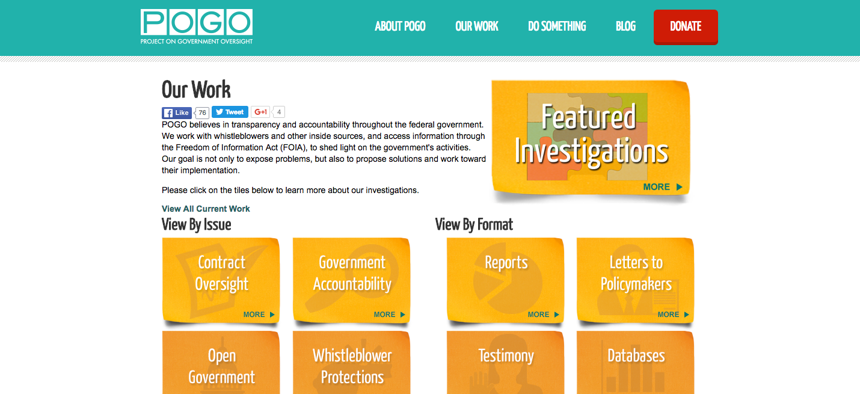
Project on Government Oversight
Two Longstanding Good-Government Groups Join Forces
Center for Effective Government to become part of Project on Government Oversight.
After more than three decades in independent operation, the budget- and regulatory-focused Center for Effective Government will become part of the Project on Government Oversight, the two organizations announced Friday.
The center, which until January 2013 was known as OMB Watch, will merge its operations into POGO, which conducts investigations and publishes studies on whistleblowers, contractor fraud, ethics and wasteful government programs.
CEG “has long been known for its important mission; the high-quality work of its staff; and its value to partners, allies, the media, policymakers and the public,” said a statement from its board of directors.
“The board concluded that the center’s mission would most effectively be served and powerfully sustained, and the greatest contributions to the field and the larger society made, in fuller collaboration with other organizations,” the statement said.
OMB Watch, which expanded from a budget focus to consumer, environmental and financial regulatory affairs, was founded in 1983.
Danielle Brian, executive director of POGO, founded in 1981, said, “We are honored to build upon and continue the vital work CEG has been doing for more than three decades to strengthen democracy by connecting national policy debates with the concerns of everyday Americans. POGO’s mission of a government that’s more effective and accountable will be bolstered and enriched by the work and legacy of CEG.”
POGO’s website will now have a section titled “Effective Government.”
Asked whether CEG had fundraising problems, Board Chairperson Dianne Stewart told Government Executive that money wasn’t the primary concern, “though there were some changes in the priorities of some funders.” The center’s leaders “also made changes in mission and vision,” she said. “Every nonprofit has to find ways to weather these things, and we were fortunate to have a reserve fund. What we really had to decide as a board was what was the best way for our legacy and mission to move forward. We made a choice -- and not all organizations do -- that we were willing to adapt our mission and vision and incorporate it into theirs.”







